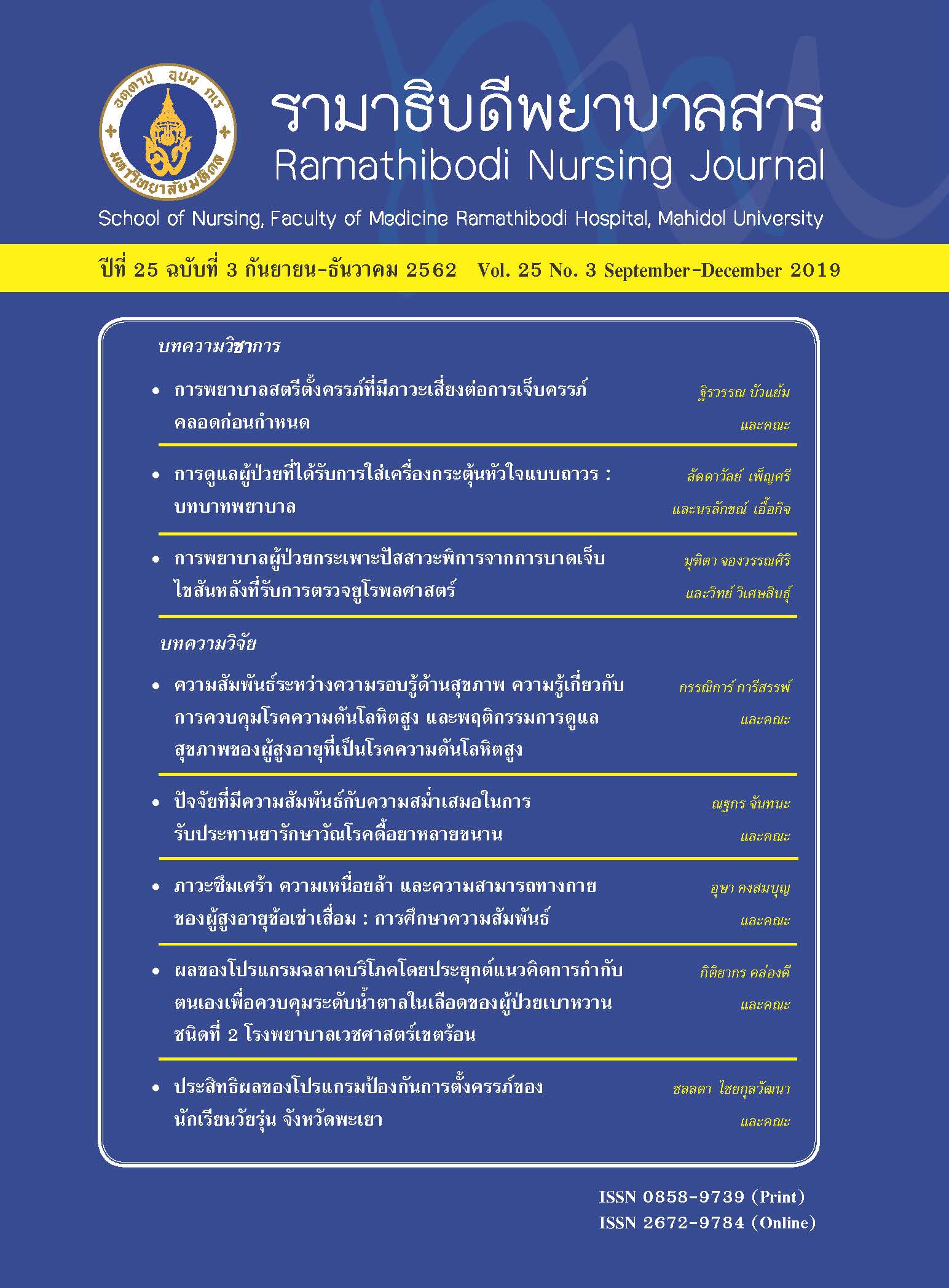Factors Related to Adherence to Multi-Drug Resistant Tuberculosis Treatment
Main Article Content
Abstract
The purposes of this descriptive research study were to describe adherence to
treatment of multi-drug resistant tuberculosis (MDR-TB), and examine relationships between
patient factors, attitude towards MDR-TB and treatment, social support, disease characteristics,
medication factors, and clinical setting factors with adherence to treatment of multi-drug
resistant tuberculosis (MDR-TB). Purposive sampling was used to recruit a sample of 75
patients with MDR-TB who sought services at Makarak Hospital, Kanchanaburi Province.
Data were collected using a structured interview guide from September to December 2017.
Descriptive statistics and Chi-Square test were used to analyze the data. The study revealed
that attitude towards MDR-TB and treatment, overall and subscales of social support, as well
as convenient access to service, had significant relationships with adherence to treatment of
MDR-TB. However, age, gender, marital status, education, income, disease characteristics,
medication factors, distance to a clinic, traveling time to a clinic, waiting time at the clinic to
receive health services, convenience of the clinic, and frequency of appointment visits had no
significant relationship with adherence to treatment of MDR-TB. The results of this study are
useful for enhancing adherence to the treatment of MDR-TB. Patients should be informed
about the proper use of MDR–TB medications and the benefits of adherence to the treatment
of MDR–TB. Nurses should educate and motivate patients with positive attitudes towards the
treatment of MDR–TB, along with promoting social support and convenient access to services
to increase the MDR–TB cure rate.
Keywords: Multi-drug resistant tuberculosis, Adherence to treatment, Attitude, Social support
Article Details
บทความ ข้อมูล เนื้อหา รูปภาพ ฯลฯ ที่ได้รับการตีพิมพ์ในรามาธิบดีพยาบาลสาร ถือเป็นลิขสิทธิ์ของวารสาร หากบุคคลหรือหน่วยงานใดต้องการนำทั้งหมดหรือส่วนหนึ่งส่วนใดไปเผยแพร่หรือเพื่อกระทำการใด ใด จะต้องได้รับอนุญาตเป็นลายลักษณ์อักษรจากรามาธิบดีพยาบาลสารก่อนเท่านั้น
References
2. Ministry of Public Health. National Tuberculosis Control Programme Guidelines, Thailand; 2018
3. Kanchanaburi Information and Communication Technology Center. Ministry of Public Health. Annual Report; 2015
(cited 2016 September 11). Available from: https://kanpho.go.th/index.php/component/content/featured
4. Tanphasertsuk S. Situation and study of various factors related to the spread of primary drug resistant tuberculosis
in Thamaka Kanchanaburi. Disease Control Journal.2015;43(4):403-12. (in Thai)
5. Ickovics JR, Meade CS. Adherence to antiretroviral therapy among patients with HIV: a critical link between behavioral and biomedical sciences. J Acquir Immune Defic Syndr.2002;3(31),98-102.
6. Komkhuntod C. Factors related to medication adherence among persons with diabetes mellitus type 2 [thesis].
Nakhon Pathom: Mahidol University; 2011. (in Thai)
7. Wongyai S, Maneesriwongul W, Putawatana P. Factors related to medication adherence among patients with
diabetes type 2 at diabetics clinic. Journal of Boromarajonani College of Nursing, Bangkok. 2014;30(2):80-9. (in Thai)
8. Taengsakha K, Maneesriwongul W, Putawatana P. Factors related to adherence to treatment in essential hypertensive
patients with early renal insufficiency. Rama Nurs J.2019;25(1),87-101. (in Thai)
9. Wongyou S. Factors related to medication adherence among tuberculosis patients. [thesis]. Nakhon Pathom:
Mahidol University; 2005.
10. Julawet W. Problems and obstacles leading to medication non-adherence in patients with pulmonary tuberculosis.
[thesis]. Nakhon Pathom: Mahidol University; 2011. (inThai)
11. Maneesriwongul W, Tulathong S, Fennie KP, Williams AB. Adherence to antiretroviral medication among HIV-positive
patients in Thailand. J Acquir Immune Defic Syndr.2006;43(Suppl1): S119-22.
12. House JS, Kahn RL. Measures and concepts of social support, In Cohen S & Syme L (Eds.). Social Support and
Health. New York: Academic Press; 1985, p. 83-105.
13. Pinprapapan E, Panuthai S, Vannarit T, Srisupan W. Causal model of adherence to therapeutic regimens among Thais with hypertension. Pacific Rim Int J Nurs Res.2013;17(3),268-81.
14. Sinasingharet R. Factors related to medication adherence in tuberculosis patients. [thesis]. Burapa University; 2007.
(in Thai)
15. Sinthawacheewa S. Problems and obstacles leading to medication non-adherence in patients with pulmonary
tuberculosis: a case study in community hospital. [thesis].Nakhon Pathom: Mahidol University; 2009. (in Thai)
16. Tansuphasawadikul S, Poprawski DM, Pitisuttithum P, Phonrat B. Non adherence in tuberculosis treatment among
HIV patients attending Bamrasnaradura Hospital,Nonthaburi. J Med Assoc Thai. 1998;81:964-9.
17. Adane AA, Alene KA, Koye DN, Zeleke BM. Nonadherence to anti-tuberculosis treatment and determinan factors among patients with tuberculosis in northwest Ethiopia. PLoS One. 2013;8(11):e78791.
18. Cameron C. Patient compliance: Recognition of factors involved and suggestion for promoting compliance with
therapeutic regimens. J Adv Nurs. 1996;24:244-50.
19. Asipong P. Health behaviors and metabolic syndrome among people with HIV receiving antiretroviral therapy.
Journal of Boromarajonani College of Nursing, Bangkok.2018;34(3):3-42. (in Thai)
20. Maneesriwongul W. The knowledge synthesis of medication adherence for people receiving antiretroviral
therapy. In Ningsanon P, Chasombat S, Jirawataphaisan T, Maisuwan S. Lessons learned for enhancing medication
adherence for people with HIV/AIDS receiving antiretroviral therapy. Bangkok: The Agricultural Cooperative Federation of Thailand; 2004, p. 9-20.(in Thai)
21. Chaichan M, Maneesriwongul W, Visudtibhan SJ.Relationships between personal characteristics, barriers to access to care, perceived stigma, and medication adherence among people living with HIV. Journal of Phrapokklao Nursing College. 2015;26:78-92. (in Thai)
22. Nur Hassan M. Compliance with treatment among tuberculosis patients under family-based DOTS strategy in Udonthani Province, Thailand. [thesis]. Nakhon Pathom: MahidolUniversity; 2006.


